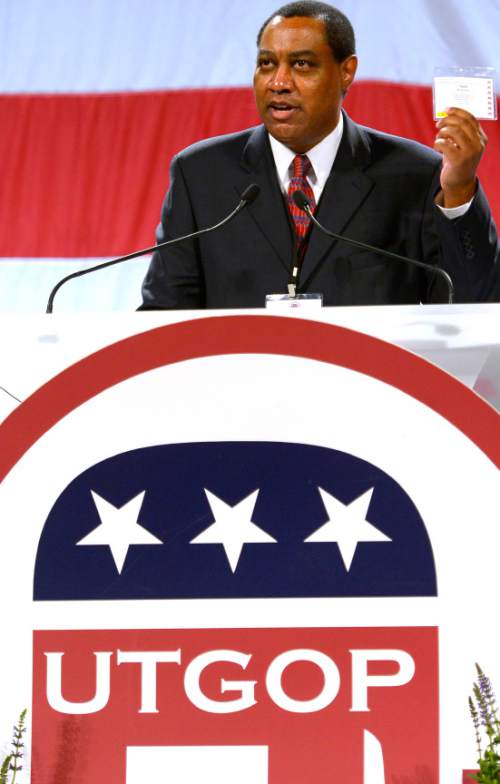This is an archived article that was published on sltrib.com in 2014, and information in the article may be outdated. It is provided only for personal research purposes and may not be reprinted.
The Utah Republican Party plans to file a lawsuit Wednesday, asking a judge to declare unconstitutional a deal to let candidates compete for the party nomination while circumventing the party's convention process.
Meantime, a state senator and opponent of the deal, Sen. Scott Jenkins, R-Plain City, said he will once again sponsor legislation that would essentially obliterate the agreement, allowing parties to make their own rules when it comes to nominating candidates.
Legislators struck the deal at the end of the 2014 session in response to a ballot-initiative drive by the Count My Vote group, which sought to let candidates gather signatures to get on the party's primary ballot, rather than be selected by party delegates.
Leaders of the Count My Vote movement, including former Gov. Mike Leavitt, a Republican, argued the convention process puts too much power in the hands of the delegates, who are typically more strident partisans and don't represent mainstream Utahns.
The GOP plans to argue in its lawsuit that attempts by the state to dictate the organization's nominating process violates its First Amendment right to free association.
"My position has always been that the government doesn't have the authority to dictate how we select our nominees, period," said Utah Republican Party Chairman James Evans. "A court will clearly have to define those boundaries and, absent that, the only boundary we have is what was passed in the law, and that is simply not constitutionally appropriate."
The lawsuit has been a long time coming and is a strategy that has twice been endorsed by the party's governing body and once received a vote of support from delegates. Evans said he plans to file the suit on behalf of the party on Wednesday.
It will then fall to the attorney general and the lieutenant governor to defend the law, SB54, a compromise with the Count My Vote group that received broad support during the legislative session.
Kirk Jowers, one of the leaders of the Count My Vote movement, said he has met with representatives from both state offices and they have assured him they would defend the law "with vigor."
"We anticipate the state defending its law forcefully," Jowers, an attorney, said. "I think there really is zero legal question on the heart and soul of SB54."
Jenkins, meantime, said Monday he will once again introduce a proposed amendment to the Utah Constitution which would plainly state that parties can pick their nominees any way they want, without interference from the state.
It would, in essence, wipe out the agreement struck in SB54.
"That dings Count My Vote pretty hard," he said.
Jenkins said he also plans to sponsor a bill that allows parties to decide who is allowed on their party primary ballot, even if the state is paying for the primaries.
Organizers of the Count My Vote effort spent months gathering signatures to try to put an initiative on the 2014 ballot that, if approved, would have allowed candidates who gather enough signatures from voters to appear on the party's primary election ballot.
But before the signature deadline, Count My Vote organizers struck a deal with legislators that enacted much of what they wanted starting in the 2016 election in exchange for them abandoning their initiative push.
Jowers argued in a commentary in The Salt Lake Tribune that reversing the deal that was struck, as Jenkins' proposals would do, usurps the will of the people.
But Jenkins said he never agreed to any compromise.
"I made no deal there. I didn't vote for it. I didn't vote for any of those deals," he said. "They can all be undone. There's nothing sacred about that. … I fought it from Day One and I'm still going to fight it."
Count My Vote organizers argued that giving candidates a way to get on the primary ballot without going through the convention would result in the selection of more moderate nominees and encourage turnout at elections, because voters won't feel disenfranchised.
Utah, which once had among the nation's highest voter turnout, has seen the number falling in recent decades.
In the Nov. 4 election, 46 percent of registered voters cast ballots.
Twitter: @RobertGehrke



